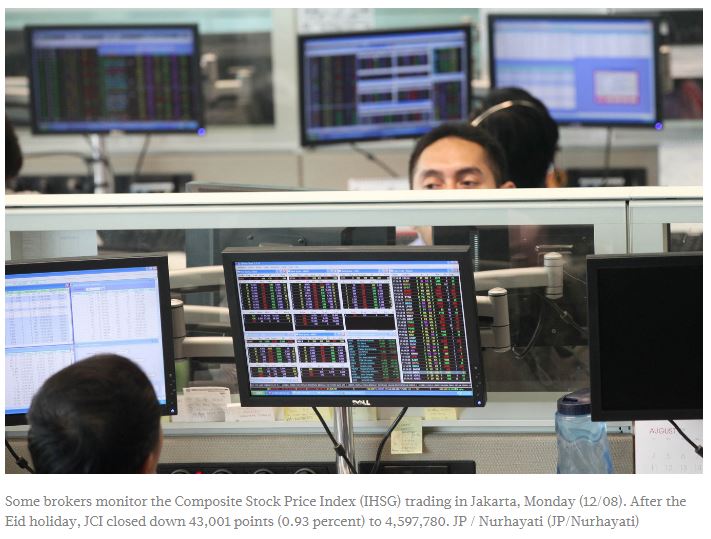Indonesia: Retail investors growing as brokerages intensify online access
The number of retail investors is rising as a result of growing awareness about the importance of investing, despite the market consensus that volatility will continue amid the COVID-19 pandemic.
Mandiri Sekuritas, the country’s most active brokerage house by transaction value, booked 11,000 new customers in the retail segment during the first four months of the year. Currently, the company has more than 133,000 retail customers, of whom 90 percent invest online.
Mandiri Sekuritas says the average transaction value for its retail customers almost doubled in April in comparison with the average value in January.
“The COVID-19 pandemic has inevitably changed people’s behavior to become more adaptive to technology, with the use of technology for investing being no exception,” Mandiri Sekuritas director Theodora VN Manik said in a written statement.
The growing enthusiasm among retail investors is also evident in the participation rate the company has seen on its education platform. Mandiri Sekuritas has held around 70 classes, which have been followed by a total of more than 12,000 participants.
Some 2.4 million people in the country were registered as individual investors as of the end of 2019, with nearly 45 percent of them aged 21 to 30 years old, according to single investor identification (SID) data from the Indonesian Central Securities Depository (KSEI).
Indo Premier Sekuritas, which is also among the most active brokerages on the Indonesia Stock Exchange (IDX), is aiming for a 40 percent increase in customer numbers in the next year after seeing a monthly average of 200 to 300 new customers so far this year.
“With many people staying at home, working from home, and with some having their work, business and income disrupted, they begin to realize the need for investments,” Indo Premier Sekuritas president director Moleonoto told a livestreamed media briefing on Wednesday.
Around 60 to 70 percent of Indo Premier’s transactions come from retail investors.
Moleonoto added that Indo Premier especially aimed to increase the number of its retail customers in the upcoming year. In line with that target, the company has relaunched its mobile trading platform called IPOT to further tap into Indonesia’s growing number of smartphone users.
The app is now equipped with new features that were previously only available on desktop platforms, such as a complete charting feature and a robo-trading feature that used to only be accessible to institutional investors.
“Currently, around 70 percent of our stock transactions occur on the desktop platform. Hopefully, at least in the next two years, the proportion will be equal, and by the third year, the mobile platform should dominate against the desktop platform,” he said, adding that in the future, “mobile is everything”.
Digital investment portal Tanamduit also reports that its total assets under management (AUM) for mutual fund products grew by 20 percent throughout the year, as of May 26, with a notable surge of fund placements from mid-April until the end of May.
Tanamduit cofounder and managing director Rini Hapsari explained that until the end of May, the company’s AUM was recorded at Rp 430 billion, an increase of around 23 percent compared with the end of December last year.
At the same time, the number of customers registering on its platform has increased by 31 percent to around 230,000 people, as reported in a press release published on May 29.
There had been a shift in the composition of AUM for its mutual fund products, Rini noted, in which stock market mutual funds increased to 42 percent by the end of May, from 25 percent by the end of last year. Money market mutual funds decreased to 48 percent from 58 percent.
She attributed the shift to Tanamduit’s success in urging customers to take advantage of today’s low share prices as part of their long-term investments.
The recent market rout that followed the outbreak of the novel coronavirus has sent global share prices to historic lows, including in the local bourse. Analysts have said that such market volatility will continue along with the progress of the pandemic.
“Volatility in the capital market will always exist. As long as it can be managed, it should be okay,” Mirae Asset Sekuritas Indonesia head of research Hariyanto Wijaya told The Jakarta Post on Wednesday when asked about the recent uptick in investments from retail investors, despite the market volatility.
He added that the current work-from-home policy had freed up time for people to trade, which contributed to the increase in retail investors’ trading activities.
While some investors have no problem taking risks in the stock market, others are opting for government bonds as a safe haven and the government is trying to optimize this strong appetite.
Government debt securities director Deni Ridwan of the Finance Ministry said that although the COVID-19 pandemic had depressed some people’s financial conditions, others were actually left with excess liquidity or growth in investable funds. This is especially true because their spending during Ramadan and Idul Fitri was relatively low, he added.
The ministry has made a decision to issue retail government bonds (ORI) rather than saving bond retail (SBR) to meet market demand.
“The change was made in accordance with suggestions from our stakeholders, especially from our distribution partners for retail SBN [government bonds], which indicated a preference from investors or potential investors for ORI,” Deni said in a text message.
Investors still prefer to hold liquid assets as a precaution, hence ORI, which are readily tradable, are viewed as suitable investments in today’s market, Deni said.
Initially, the issuance of SBR-010 was scheduled for between June 23 and July 9, according to the Finance Ministry’s issuance calendar.
Source: https://www.thejakartapost.com/news/2020/06/04/retail-investors-growing-as-brokerages-intensify-online-access.html


 English
English




